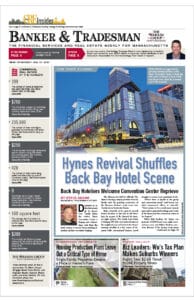
Galaxy Life Sciences spent $4 million on development sites next to Worcester’s Reactory biomanufacturing project this spring for a clinical manufacturing facility. Image courtesy of Galaxy Life Sciences
Worcester’s biggest life sciences development site could get a lot bigger thanks to a proposal the city’s Planning Board is expected to consider next month.
Matthew Zicaro, vice president of real estate development at Webster-based Galaxy Life Sciences, told Banker & Tradesman his company has asked city officials for site plan approval to allow a planned 90,000-square-foot biomanufacturing development at the city’s Reactory life science industrial park to nearly triple in size, to 246,000 square feet, to serve an undisclosed prospective tenant. The Worcester Business Journal first reported the story.
Zicaro said the proposal would extend across two adjacent development pads, from “Lot D” next to drugmaker AbbVie’s research complex to “Lot B” just to the north.
Galaxy dropped $4 million on the two parcels, plus the neighboring and much larger “Lot A,” from the city’s Worcester Business Development Corp. earlier this year according to documents filed in the Worcester Registry of Deeds, with the intent of doing additional development work and filling the sites with tenants. The sale comes two years after the WBDC sold the Reactory’s first parcel to contract manufacturer WuXi Biologics. WuXi is expected to open that nearly 200,000-square-foot facility next year.
The proposed 246,000-square-foot building could cost around $150 million to build and support a facility capable of employing between 250 and 300 people, Zicaro confirmed. The remaining undeveloped parcel in the Reactory, the 20-acre Lot A “has the most potential for a larger facility that would likely require more new employees,” he said.
The proposal comes as the infant biomanufacturing sector in the state is trying to recover from headwinds faced over the last year. Originally billed as the well-paying, blue-collar compliment to the research labs filling Cambridge, Watertown and parts of Boston, what was once around 2 million square feet of requirements last summer had dropped to 1 million square feet this summer, according to Newmark research, as what had been a fire hose of venture capital investment directed across the region’s life science sector slowed 30 percent in the face of rising interest rates, according to trade group MassBio. Still, experts predict demand for biomanufacturing real estate – needed to synthesize drugs under development for clinical trials or even mass production – in Massachusetts to continue, but grow at a slower rate.






